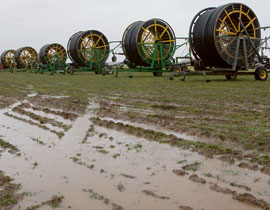Act now to save water, farmers urged

Action to protect water supplies must be taken now to avoid restrictions later, farmers are being warned.
The Environment Agency called on farmers to invest in winter storage facilities, such as reservoirs, to protect water supplies for agriculture.
Doing so would minimise the risk of water restrictions in the future, the agency warned in a report published on Tuesday (12 July).
The Drought Prospects report was commissioned by DEFRA in response to the recent widespread drought across eastern England.
DEFRA secretary Caroline Spelman said: “While we have had some much needed rain in recent weeks, events like this year’s drought could become ever more common.
“All the main players – water companies, farmers and consumers – will have a role in dealing with this in the future.”
The document shows that a dry winter could lead to significant problems in drought-hit areas next year and calls for action to minimise the impacts.
This year’s drought has left public water supplies largely unaffected, acknowledges the report.
But restrictions have been imposed on some businesses that pump water from rivers to prevent damage to the environment.
Growers have been hardest hit, since they rely heavily on abstractions from rivers to irrigate crops during the spring and summer.
Farmers can become more drought resilient by constructing reservoirs, the report recommends.
Those who do not have a winter storage reservoir should investigate whether building one is feasible and possible sources of financial support.
Farmers need to work together to develop solutions to ensure current supplies last as long as possible, the report adds.
This could include the continuation of “water co-operatives” to share water and applying voluntary restrictions when required to avoid formal measures.
The Environment Agency said that timely and prudent actions taken now would maximise farmers’ ability to withstand the impacts of any long drought.
Agency chairman Chris Smith said the organisation was better prepared than ever for extreme drought but more could be done.
“It has been tough for many farmers and we are working hard to find ways to help them, while also protecting the environment.”
Water companies, farmers and other businesses should look again at ways to store water and reduce and share the amount they use, said Lord Smith.
“There is a careful balance to be struck to meet the water needs of businesses, farmers, households and the environment and everyone has a part to play.”
Water companies in drought-affected areas should follow their drought plans, which included encouraging consumers and businesses to use water wisely.
Companies should also prepare plans based on different rainfall scenarios that might occur during the winter, so they were ready to take action if necessary.
The report’s recommendations will inform a forthcoming Water White Paper that will outline the government’s plans for efficient water use.

